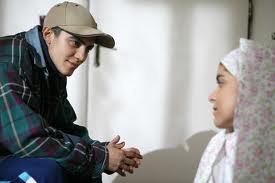Transgender identities and trans* embodiment are topics that are generally ignored within many communities, and the Muslim community is no exception, and transgendered people are oftentimes pushed to the margins.
Art, film, music and other forms of artistic expression, unlike more fixed modes of understanding, can often open up a conversation that communities and individuals may be hesitant to explicitly explore. As I was cruising tumblr recently, searching for thought provoking and groundbreaking work by women of colour, I stumbled upon a movie trailer entitled, Facing Mirrors. Directed by first-time directing Iranian woman Negar Azabayjani, this feature film tackles the complex realities of transgendered men and women in a country that is known for its religious stances and fatwas that have violated the rights of its citizens.
The trailer doesn’t say much, but clearly reflects the fears, pains and stigmas that are present in Iranian society, which has psychological effects for both those who are transgendered and those who struggle to understand its complexity, in a country that represses members of the LGBT community.
The film follows the lead character, originally known as Adineh but who uses the self-chosen name Eddie, belongs to a rich family and whose father is both ashamed and humiliated by Eddie’s wish to undergo gender reassignment surgery.
Instead of the film tracking Eddie’s journey through utilizing Iran’s program that provides access to gender reassignment surgery, it instead tells a story where Eddie desires to travel to Germany to receive his surgery. During his journey of escaping his family, he bumps into a female taxi-driver of a lower economic class, another representation of challenging traditional gender norms in Iran, who find themselves in a friendship that focuses on each other’s liberation.
Facing Mirrors is a brave film that forces audiences to critically think about sexuality, gender and religion in Iran and the Middle East. It has become public knowledge that the Islamic Republic of Iran has engaged in political and social repression of members of the LGBT community. People have faced persecution, have been forced into exile and others sentenced to death because of their sexual orientation and identities. (In)famously, President Mahmoud Ahmadinejad has been quoted as saying, “In Iran we don’t have homosexuals like you do in our country…” outwardly denying the existence of perceived societal abominations.
It is important to point out, that although Iran does provide subsidized gender reassignment surgery, its use is not necessarily a means for liberation for those who undergo the operation. As a response to homosexuality, Ayattolah Khomeini legalized the operation and ultimately gave doctors and families permission to diagnose gay and lesbians as transsexual in order to relieve them of their “sin.” Clearly, cases of forced surgery and the unique nature of homophobia and transphobia in Iran differ from cases here in the West. To further complicate the treatment of gay, lesbians and transgendered people (forced or voluntary) in the Middle East, is the construction of narratives that pitch the Middle Eastern world as inherently backward and inferior to the West, and also Israel; the perceived “liberal beacon” of the Middle East.
Discourses around sexuality in the Middle East are currently situated in a climate of anti-Muslim sentiment by both those in Western Europe and apartheid Israel. The practice of “pinkwashing” is a trend that is informing and influencing how people outside of the Middle East view Muslim and Arab countries. Pinkwashing is essentially a tool, particularly used by the state of Israel to blanket its human rights abuses against Palestinians living in the Occupied Territories and in Israel major, by branding and promoting itself as a nation that is gay and queer friendly, in other words, as “an international gay vacation destination.” With the push of advancing their international reputation as a haven for queers, Israel and its apologetics essentially create a narrative where Arabs and Muslims are seen as “homophobic fanatics”, while blanketing people’s experiences of being both gay, lesbian, transgendered and Muslim or Arab. This narrative has a particular relation with Israel’s position against Iran.
A film like Facing Mirrors puts into question the ways in which we think about the real lived experiences of those who are queer and living within a Muslim state. The film in terms of its content, and those who have produced and directed the film and are in support of rights for transgendered people in Iran, provides an opportunity for audiences to look at the complexities of the issue. The film can both challenge and/or reinforce simplistic notion that all Iranians, Arabs and/or Muslims are intolerant to queer-identified people; however, the directors seem to bravely venture into highlighting and exploring the nuances of trans* and queer experience in Iran.



